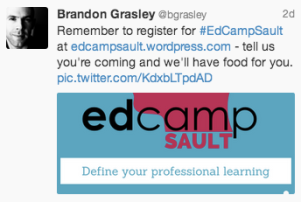I enjoyed my recent opportunity to present a session on ever changing EdTech world in K12 education at EOIT2014. Three points from the various conversations over the day captured my attention.
Limestone DSB, CIO Wayne Toms described how becoming active on Twitter has “changed his approach to PD forever”. He emphasized the importance of having access to a stream of current information and thinking to shape one’s perspective underscoring the importance of connected learning.
If fact, this coming weekend, two Ontario based EdCamps are happening on May 10th as per the “Tweet captures” below. Connected learners can participate by following #edcampsault and #edcampisland.
IT leaders Ron Plaizier and James Proulx openly discussed the challenges of “all the moving pieces” – technology changing at a rate much faster than classroom practices shift and support models can be adapted. There are no easy answers. The best strategy is to bring people together for conversation and time to play in this “change space”. Agreed!
The third conversation focused on a notion I would call the software “power” gap – the difference in capability when comparing a desktop application version against the corresponding web version. This power gap differential exists in many applications. In my view, the critical piece of this puzzle is at the intersection of desktop > mobile, local > cloud and minimal NEEDed functionality vs extra features. One “crystal ball” question is how long might it take to reach the ideal cloud based offering of a particular application?
I also wanted to share of few highlights from the back channel related to “What is the most important aspect of your work?”
Related Resources
View presentation file
Twitter chat for #EOIT2014
Blog articles related to the Futures Forum project.
Blog articles on the SAMR model.
Scoop.it articles on SAMR
~Mark








Thanks for joining us in Ottawa..your presentation ignited lots of great discussion with my team.